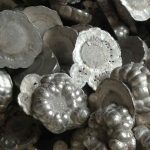Titanium and its alloys have many excellent characteristics such as light weight, high strength, strong heat resistance, and corrosion resistance. They are known as the future metals and new structural materials with promising development. Titanium and its alloys not only have very important applications in the aviation and aerospace industries, but also have begun to be widely used in many industrial sectors such as chemical industry, petroleum, light industry, metallurgy, and power generation. The application of titanium in the chemical industry and other sectors. Another remarkable feature of titanium is its strong corrosion resistance. This is because it has a particularly strong affinity for oxygen and can form a dense oxide film on its surface, which can protect titanium from Corrosion of the medium. Titanium metal can form a passive oxide film on the surface in most aqueous solutions. Therefore, titanium has good stability in acidic, alkaline, neutral salt solutions and oxidizing media. It has better corrosion resistance than existing stainless steel and other non-ferrous metals, and is even comparable to platinum. However, if the oxide film on the titanium surface can be continuously dissolved in a certain medium, the titanium will be corroded in this medium. For example, titanium is corroded in hydrofluoric acid, concentrated or hot hydrochloric acid, sulfuric acid, and phosphoric acid because these solutions dissolve the oxide film on the titanium surface. If oxidants or certain metal ions are added to these solutions, the oxide film on the titanium surface will be protected, and the stability of titanium will increase at this time. Chemical industry Titanium has good stability in various acid, alkali, and salt media, except for the above four inorganic acids and the highly corrosive aluminum chloride. Therefore, titanium is an excellent anti-corrosion material in the chemical industry and has been used more and more widely. For example, the use of titanium metal anodes and titanium wet chlorine coolers in the chlor-alkali industry has achieved good economic results and is known as a major revolution in the chlor-alkali industry.
Petroleum industry Titanium has very good stability in organic compounds, except for five organic acids (formic acid, acetic acid, oxalic acid, trichloroacetic acid and trifluoroacetic acid) at higher temperatures. Therefore, titanium is an excellent structural material in petroleum refining and petrochemical industry, and can be used to make various heat exchangers, reactors, high-pressure vessels and distillation towers. Metallurgical industry Titanium is an active metal with good gas absorption properties. It is an excellent degassing agent in the steelmaking industry. It can combine the oxygen and nitrogen that are precipitated when steel is cooled. Adding a small amount of titanium (<0.1%) to steel can make the steel tough and elastic. Titanium is also an important alloy additive in steelmaking and aluminummaking industries. Titanium has superconductivity and is a common superconducting material. In addition, titanium has good stability in acidic solutions containing metal ions. Therefore, titanium is widely used in the electrolytic production of non-ferrous metals such as copper, nickel, cobalt, and manganese in the hydrometallurgical industry. Urea is an important fertilizer in the chemical fertilizer industry. In the production process, urea, ammonia, ammonium carbamate and their mixtures are very corrosive under high temperature and high pressure conditions. After using titanium to replace stainless steel, the life of the equipment is greatly increased, and the maintenance time is greatly reduced. . Therefore, the main equipment in urea production currently uses titanium. Seawater desalination and shipbuilding industry Titanium has better resistance to seawater corrosion than all other metals. Titanium has special stability in static or high-speed flowing seawater.
Therefore, titanium is an ideal material for seawater desalination equipment. The number of applications of titanium in this field will increase. Titanium has strong resistance to sea water and ocean air corrosion, and is strong and light. It is an ideal structural material for the shipbuilding industry. It has been widely used in many parts of various ships and deep-water submarines. Electric power industry Titanium has good stability in many corrosive hot water containing chlorides, sulfides, etc. Therefore, titanium has been used in large quantities as cooling tubes of heat exchangers in thermal power plants. After replacing the copper-nickel alloy tube with a thin-walled titanium tube, not only the service life is greatly increased, but also the maintenance time is greatly reduced, and the economic effect is very significant. Papermaking and textile industry Titanium has special corrosion resistance to chlorine dioxide, chlorite, chlorite and other bleaching agents. Therefore, titanium has important applications in bleaching equipment in textile printing and dyeing industry and papermaking industry. For example, the sub-bleaching machine made of titanium has a good effect. At the same time, it is used as a spinneret in industries such as synthetic fibers.
Link to this article:Where are titanium and titanium alloy materials used?
Reprint Statement: If there are no special instructions, all articles on this site are original. Please indicate the source for reprinting:Alloy Wiki,thanks!^^


